THE GLOVES ARE off! Let me explain. On January 7th this year I attended a Naturalization ceremony in Spokane Washington. It was for me. Thirty four other non-natives and myself, from around twenty countries surrendered our green cards and took the Oath of Allegiance to the United States, not to be confused with the more widely known Pledge, but more on this later.
What? What? Grouchy English punk rocker signs up for Uncle Sam. Some of my friends on both sides of the Atlantic were confused, their question: Why on earth would you ever go and do that?
The answer is actually very simple. I did it for my children who have been bona fide English-American dual citizens since they were born to their Limey dad and Yankee mom back in the auspicious year 2000. The Nobaconeers, my daughter and son twins, were born at Leeds General Infirmary, Yorkshire, two miles from where we lived and continued to live until they were seven and a half years-old. We have lived in mighty Twisp, WA ever since, and my number one guys have just turned fourteen. That puts them in Junior High halfway through eighth grade, which means, for our English readers, that they will become fully-fledged American High School students in September of this year. We love where we live now and the children are very dialed in here, so it makes sense that their dad should be able to sleep at night without the shadowy figure of Deportation, scythe-in-hand, stalking me in my dreams.
I had decided to do this before Edward Snowden’s revelations about the intrusive habits of the NSA, but the thought of the US government intelligence agencies, having click-of-a-cursor access to some of the thoughts I would normally only share with confidantes did not exactly ease my anxiety. As I answered truthfully to the questions asked by my immigration case officer in my naturalization interview, which took place a month ahead of the ceremony, I am not a terrorist or a communist. That said, as my regular readers will know I have some very human concerns about how the planet is being propelled to oblivion by the forces of — question #11: What is the economic system of the United States? … acceptable answers: a capitalist economy, a market economy— which translates as unrestrained economic growth.
I took legal advice from a respected Seattle immigration lawyer, and she read some of the essays I have wrote for TheWeeklings. She said I would be fine because I am not advocating the armed overthrow of the US government. That’s okay then, but it may be that the world needs some kind of revolution if human civilization as we have come to know it is to survive much beyond this century. I don’t live the life of a doomsayer, but I read Common Dreams and listen to Democracy Now and the climate scientists who were warning us with 99% certainty that man-made global warming was already happening all the way back in 1989, are now warning us that abrupt climate change is increasingly likely if not inevitable. If we don’t make the revolution then Gaia will, so to speak, unleashing all the methane trapped under Siberia and beyond in the oceans in a series of almighty rushes. But, back to naturalization versus nature.
I also checked with my lawyer to make sure that swearing loyalty to the US would not mean giving up my UK passport. She assured me that the US and the UK have a special deal where the immigrant being naturalized can have both passports, though there is no mention of dual citizenship in the whole process, which is what having two passports effectively means. Here’s how it works. By virtue of being a Green Card holder for over five years, (which I got because I am married to a US citizen, the mother of my children) I had the least amounts of hoops to jump through of people applying for US citizenship. There are four basic steps.
Step 1. APPLICATION
You fills out your application and you pays your money—$595 for the form, plus $85 for biometrics ie being fingerprinted and photographed— and send it off.
Step 2. BIOMETRICS
I go to my local US Citizenship and Immigration Services (USCIS) inside the Department of Homeland Security Office, a three and a half hour drive away in Spokane WA. The literature accompanying the application stresses that if you miss your appointments, then you will have to go to the back of the queue and start all over again and re-pay the fees. It had not occurred to me until I was in Spokane, but my biometrics appointment was by chance the day after the government shutdown had ended. US Citizenship and Immigration Services (USCIS) had not warned me that had it been the day before there would have been no one there. I am in and out of there in ten minutes, and I can tell you that the latest technology makes the unique ridges on my fingers look like a minutely-detailed relief map of the Cascade Mountains.
Step 3. INTERVIEW AND TEST
The biggie. I am called back to Homeland in Spokane for my interview and to take the English language reading and writing test, and the civics test. This is the first time I have met my case officer, initially behind a sheet of bullet-proof glass, whilst she verifies who I am.
“Let me just find you on the computer,” and then she started chuckling. Another click, another chuckle. “Aww you look really tired in that one … And look at you there. You’ve shaved since then.” I cannot see the screen, but she tells me that she has all the pictures of me, the number of which goes into double figures, for every time I have gone through customs and entered the US since they started photographing foreign nationals in the wake of —question #86 What major event happened on September 11, 2001, in the United States?
My NSA tax dollars at work, for the first thing a Green Card holder is required to do when entering the US for the first time, as I had to do in 2007, was to register for, and make sure I paid US income tax. This in spite of one of the answers to question #61 Why did the colonists fight the British? —because of taxation without representation. Just so you know, Green Card holders pay tax but have no representation, meaning they cannot vote.
The case officer seems genuinely warm and cheery for 9.00 AM on a Monday morning, and I am already the second person on her itinerary. She tells me as I am allowed through the security door and into the inner sanctum of a Homeland interview room, that I am going to be easy for her because the first guy in, before she was properly awake, was awkward. I am sort of at ease, but because of the stagecraft with the photos I feel like she was just letting me know that they know exactly who I am.
We get settled and after taking an oath not to perjure myself, she starts the interview which consists of her going through my application form and her double checking the questions with me and my verbally confirming that the written answers I have given are correct. She breaks occasionally to ask me about my children or tell me that she has never had to recommend deporting anyone. Oh and she tells me of the when I.C.E. (Immigration Customs Enforcement) —the task force at the business end of deportations, who have a station just down the hall— one time had to bust into her colleague’s office to apprehend one of the applicants. Now there’s an idea for a TV show?
When she comes to the question which is phrased on the form as If, you have ever used other names, provide them below, she phrased it to me as Have you ever used a nick-name? This was my worst nightmare, for you guessed it readers Danbert Nobacon is not what it says on my birth certificate. My lawyer had said that I was not obliged to give up my stage-name, saying that the question relates to if you have ever changed your name by marriage or officially changed it in a court of law. The lawyer also said that the worst thing you can do is perjure yourself and they catch you out. I probably hesitated for a whole quarter second before revealing my nom de plume, and she dutifully wrote it on the form as I spelled it out.
Put either of my names into Google and they link to each other, thanks to some English tabloid journalist who thought he had uncovered the Holy Grail during the media storm that followed my dumping a bucket of ice water over the Deputy Prime Minister of Britain (read Vice President). It was at The Brit Awards back in 1998 (the UK’s equivalent of The Grammys) whilst Fleetwood Mac were onstage.
Interestingly, when we had decided to move to the US, I was initially going to use an agency based in London and New York, who specialized in helping musicians get work visas, to help me with the paperwork. I told them who I was and set up a phone appointment with them and the first thing the guy said was: “We put you in Google. There is no way the US will let you in,” meaning because of the Fleetwood Mac thing. I had already had (now expired) US work visas from when Chumbawamba, as a by-product of having a hit record, were stimulating the US economy to the tune of $20 million plus, in terms of record company profits, so I went my own route and applied for a Green Card myself at the US Embassy in London. At that interview it seemed that the the only thing that really concerned my case officer, knowing that I was a musician, was that I could prove I had a steady income and would not be a burden on the US economy.
The USCIS’s M-476 A Guide to Naturalization, page 25, stresses that candidates applying for US citizenship, need to have good moral character, and one of examples it gives from a long list, is saying a lack of good moral character would be demonstrated by someone who had been involved in “the persecution of anyone because of race, religion, national origin, political opinion, or social group.” (my emphasis). I was, in fact, worried that the Department of Homeland Security may be prejudiced against me, because of things that are freely available on the internet regarding my alleged political opinions.
In that split second when my case officer asked the question I guessed that they already done enough background research on me to know that I am “an anarchist punk rocker.” Despite my nervousness, to come clean, I did the right thing because looking back at M-476 page 25 now I see that it also actually says: “Lying. If you do not tell the truth during your interview, USCIS will deny your application for lacking good moral character.” (their emphasis). Curiously for some reason, this paragraph is marked by a large black anarchist star. It follows then that because I told the truth, under oath, I now have nothing to worry about.
And, now for the fun part for you guys. See if YOU can pass the test? My American born friends, including some of my Trivia Night pals, are specifically fascinated by this quiz part of the process, nearly all to a person swearing that they would fail the test. It is made up of 100 set-questions which break down thus:
12 questions on principles of American democracy;
34 questions on the US system of government;
14 questions on Colonial History and Independence;
7 questions on US history in the 1800’s;
10 questions on recent American history;
12 questions on “integrated civics” which further sub-divides into
8 on US geography; 3 on US symbols; and 2 relating to US holidays.
It sounds daunting, I know, and I certainly did not know all the answers when beginning to cram for the test, but aside from having to research who are the Governor and Senators of my state and who is the Representative of my district, it is pretty well laid out for easy learning on the government-issue CD and/or The Civics Flashcards containing all the questions and answers. With the quiz loaded on to my i-Pod on the drive over to Spokane the evening before my interview, I clocked 100 out of 100 for the first time.
And, in the actual test you are only asked 10 actual questions and you only have to get 6 of them right. Rarely a question may have more than one answer such as question #100 Name two national US holidays? which I was asked on the Monday morning after Thanksgiving weekend, when my interview took place. My case officer stopped asking questions of me after number seven.
The other questions I was asked were:
#20 Who is one of your state’s US Senators now?
#43 Who is the Governor of your state now?
#70 Who was the first President?
#53 What is one promise you make when you become a US citizen?
#84 What movement tried to end racial discrimination?
#95 Where is the Statue of Liberty?
For the English reading and writing part of the test I was asked to read the sentence George Washington was the first president of the United States and then write the sentence, The President lives in the White House. I passed those tests too, but I am not knocking the fact they are giving people a break, who do not speak English as their first language.
At the end of the interview and test my case officer congratulated me and said she was recommending that my application be accepted. On the long drive home I still could not help feeling that whoever’s job it was to double check my amended application would read the Wikipedia page on me—and would decide that my dumping water of the Deputy Prime Minister in protest at his department’s despicable treatment of striking Liverpool dockworkers, demonstrated a lack of good moral character on my part. Evidently not, because ten days later the letter arrived in Twisp, confirming the date and time of my naturalization ceremony. As it turned out, I like to think that the USCIS really do not care what my punk rock politics are, rather than they never actually did the google search.
Step 4 THE NATURALIZATION CEREMONY
You can bring your family to the ceremony to support you, but it being early January and the second day that school was back in, on top of the three and a half hour wintery drive, my guys stayed in Twisp. Instead I was accompanied by my screen wife and friend who lives in Spokane—my fave film actor Sali Sayler, with whom I share the screen in An Evil Within (which should be released this year). I had stayed at Sali’s the night before my interview so she knew all about my worries. Sali and her real husband Brian introduced me to Cards Against Humanity game, a kind of US cultural assimilation exercise, and then I quizzed them using the Civics Test flashcards and they actually scored pretty well as a team. Anyway, Sali was psyched to be along for the completion of my journey, taking pictures and being the first person to hug the newly minted Mister Nobacon, official US Citizen.
The ceremony took place in a US Courtroom in the upper echelons of the Post Office building in downtown Spokane, next door to where Homeland Security is situated. My case officer (who didn’t seem to remember me) was there briefing us on how the ceremony would unfold once the judge arrived. When the time came, we filed into the inner enclosure of the courtroom, handed in our signed declaration that nothing about our circumstances had changed since our interview and surrendered our Green Cards. In exchange we received the ‘the welcome package’ and were assigned our seats.
During the minutes before the judge arrived there was time to skim through the contents of the said magical package enclosed in a 10 x 12.5 USCIS government-issued white envelope. In no particular order a manila envelope from the White House contained a form letter of welcome from President Obama; important information about registering to vote, updating my Social Security information and how to apply for a US passport; a pocket sized-copy of The Declaration of Independence and the Constitution of the United States; a copy of The Citizen’s Almanac, a history booklet subtitled Fundamental Documents, Symbols and Anthems of the United States; a 6 x 4 American flag on a wooden stick; and a printed copy of the Oath of Allegiance, the Pledge of Allegiance and the answer to
question #98 What is the name of the national anthem?
“All rise!” Officiating was Judge John T. Rodgers who prior to ascending to the bar served for a decade as Public Defender for Spokane County. This was the second time in my life I’d been in a US courtroom. The first was back in 1995 when we were married by a judge in the Albuquerque courthouse in New Mexico, and then and now those appearances both proved to be moving not least because of the good humor, noble-spiritedness and personable humanity of both judges involved.
Firstly, I was one amongst many foreign nationals who had traveled far and made this journey from Mexico, Columbia, Peru, China, Viet Nam, The Philippines, South Korea, Burma, Australia, Iran, Nigeria, Kenya, Russia, Ukraine, Poland, The Czech Republic and Germany, and some I apologize for not being able to recall. There really is something wonderful about the idea of a country that welcomes people from all over the world, especially when you are in the moments of actually being welcomed.
Judge Rodgers swore us in and raising our right hands we all repeated after him the Oath of Allegiance. Though in some ways my defecting from the UK to the US is pretty much swopping like for like (at least where political systems are concerned not to mention language), I did appreciate the part of the oath where I had to swear to “entirely renounce and abjure all allegiance and fidelity to any foreign prince, potentate, state or sovereignty.” In my case, if you don’t know your British Civics Test, this is Prince Charles, Prince William, Prince Harry and the Queen.
With the completion of the a oath Judge Rodgers gave us his own personalized message as newly confirmed US citizens, and this was the part I found to be most moving. He said, I want you to remember three things. He elaborated on each but the gist of it was.
Firstly, welcome. Welcome to the United States. We are glad to have you. Secondly, he urged us to get involved, meaning to become politically active and that he welcomed the ideas we could bring to the mix. And thirdly not to forget who we are and where we come from, meaning our native traditions, rituals “and yes your recipes,” and I did smile at that moment thinking of the mince pies and maids of honor I had made a fortnight prior for Christmas.
All that remained was for us to file one-by-one to the front of the courthouse, shake the Judge by the hand and receive our Certificates of Naturalization, and be presented with a lapel pin by representatives of The Sons and Daughters of the American Revolution. Voila.
Given the state of the planet it was the second of Judge Rodger’s exhortations which maybe resonated the most with me. The plea to become active echoes the Civics Test question #55 What are two ways that Americans can participate in their democracy?
From a possible list of ten the answers are:
Vote
Join a political party
Help with a campaign
Join a civic group
Join a community group
Give an elected official your opinion on an issue
Call Senators and Representatives
Publicly support or oppose an issue or policy
Run for office
Write to a newspaper
The list above does not actually say a US citizen can start their own campaign, but it does not say one cannot do so either. In the spirit of how Judge Rodger’s put it, that the US wants the ideas and input of immigrants, nay needs those ideas and input, I rather think starting my own campaign is well within the bounds of actively participating in US democracy.
Which bring me to the First Amendment of the US Constitution and Thomas Jefferson’s words explaining, that there needed to be a “wall of separation between church and state.” Whilst there is separation of powers between the five branches of US government and checks and balances to make sure no one branch of government becomes too powerful, the ongoing war of deregulation fought by corporations against we-the-people has ensured that no such wall exists between state and corporation.
The churches and robber barons of Jefferson’s time have been replaced by today’s corporations which work ceaselessly to strangle genuine American democracy at every turn. Pick any contentious issue, and follow the money. Behind the ‘citizens united’ front groups are P.R. companies writing the narratives of endless economic growth; marketing teams re-creating the American Dream in the corporate image; lobbyists press-ganging our legislators; and lawyers deployed to sue anyone who gets in the way of, corporate access to government. It is not rocket science. On the un-level playing field that grants corporations “personhood” and first amendment rights, and sets no limits on bribes, big money buys and subverts democracy almost every time.
On January 9th 2014 along with fellow Founding DJ’s at The Mystery Motel, we launched the Campaign for the 28th Amendment of the US Constitution: to enshrine the separation of state and corporation. And in so doing I am actively participating, as is my right and duty as a US citizen to defend the true character of American democracy. As a father of twins, again I do it for my children, so that the corporate pillage of the planet might be halted and so that they may actually inherit a habitable world that we of all nationalities call home. Watch this space

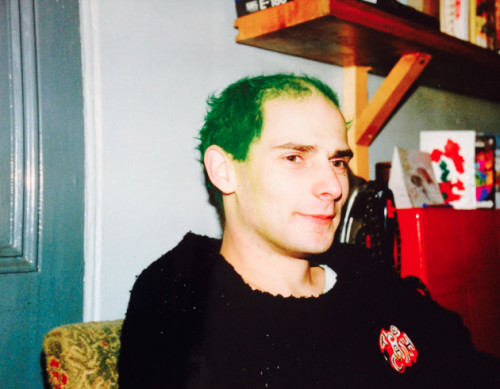
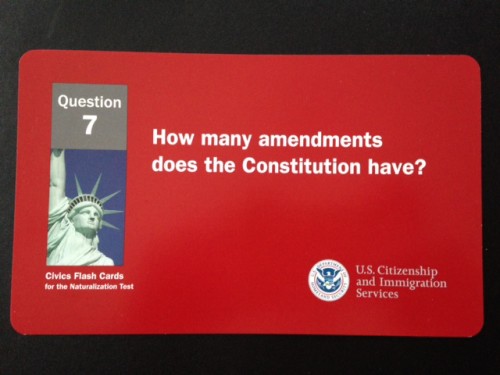

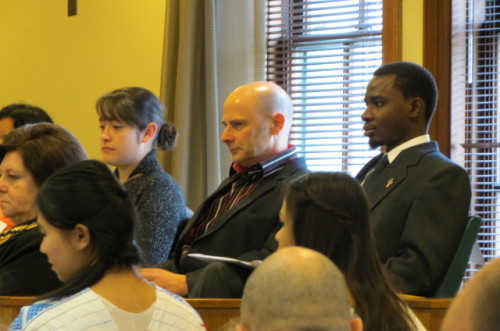
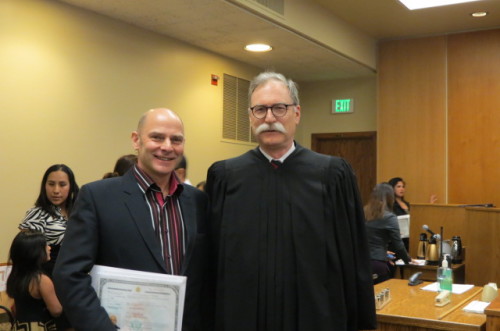
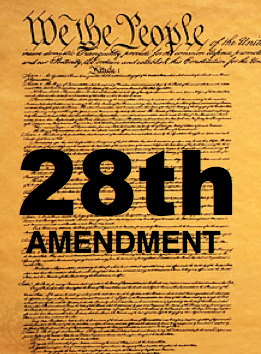


Danbert – Bravo. Congratulations. I applaud you. I think you’re slightly off on the logic of Amendment No. 28, but I support the idea generally. (My own thought is that term limits for Senators and Reps should be No. 28). Here’s the problem – corporations are doing exactly what they have to – and what those sitting in the seats have forced them to – they’re competing with each other (against other corporations), except instead of competing in the marketplace, they’re competing at the trough of government to ensure they don’t get hosed by regulation and legislation. Government is so pernicious and omnipresent that corporations have to spend millions upon millions in order to get favorable legislation (ideally) or at least limit the harm of bad legislation. I’m not saying corporations are right – and I have nothing but disgust for a company that chooses to try to lock out or beat its competitors by out-lobbying them for special status, vice producing a better mousetrap. But the simple fact is that government is the problem. Without state sanction or special status, corporations exist solely to the extent they can convince you to voluntarily give up your money for their product. You’re free to not buy an iPhone, or any phone at all. But only government can force you to do it. I figured even a (former) anarchist would appreciate that. ;-) Good luck.
Hey Dale thanks for the comments. It seems to me that both government and corporations are the problem because they have this symbiotic relationship which trashes human concerns and makes a mockery of the idea of genuine democracy … … I am just trying to draw attention to the fact that both are in lock-step in a cycle that fails the needs of ordinary people and the planet … that the whole system is riddled with corruption … asking the President or Congress to change the laws to strictly limit the influence of corporations is not going to work, but high-lighting the simple fact that corporations and government are aiding and abetting each other in driving the habitable planet to destruction, may add to the weight of popular opinion, the axis of dissent around the world, that might bring about some change for the better.
Congrats Dan. Very interesting read. I pulled out the Unfairy Tale and Bigger than Jesus tonight and did a bit of reminiscing. Love these recordings. Such a wonderfully creative period of time. Surprised they didn’t ask you about that Bigger Than Jesus cover..haha. Best wishes for health and happiness to you and your family.
Clarification requested. Your analysis of government–corporation collusion (or “symbiosis”) shows that you really will become a valuable member of our U.S. citizenry. Indeed, you ought to have been recruited rather than simply allowed. The question is about your Amendment proposal, specifically, how does it differ from the current campaign called “Moved to Amend,” declaring that corporations are not persons?
Danbert – we’ll have to respectfully disagree on one point. A corporation is nothing more than a voluntary association of people. They become a problem when they use government to further their market share, rather than through the pursuit of excellence of their chosen product or service (in that respect, we agree). But a corporation qua corporation is worthless if people don’t buy its product or service. They have no coercive authority or power. No one can force me to buy an iPhone. Ever. The problem is when they get in bed with government and under either the guise of “regulation” or for the “common good” they suddenly start buying favor from politicians, who are oh-so-happy to provide favorable legislation in return for $$. But that transaction shows exactly wherein the problem lies- it’s with our elected officials who are for sale. And no amount of “corporate regulation” solves that problem. None. Nothing. Even if you dissolved corporations (which would likely be unconstitutional), it would simply shift the graft from a corporate entity to individuals. Nope – the problem is government, my friend. I know many people of a certain political persuasion want to rail about “evil corporations” and feel more government is the answer, but if more government is the answer, someone is asking the wrong bleeping question. No, the answer is (1) term limits (it’s hard to set up the necessary graft apparatus if you’re only there for 2 terms for the Senate or 10 years for the House), and (2) finding a way to amend/undo the impact of the Citizens United decision.
Pingback: Video Series: smallsongs: danbert nobacon • Americana Highways